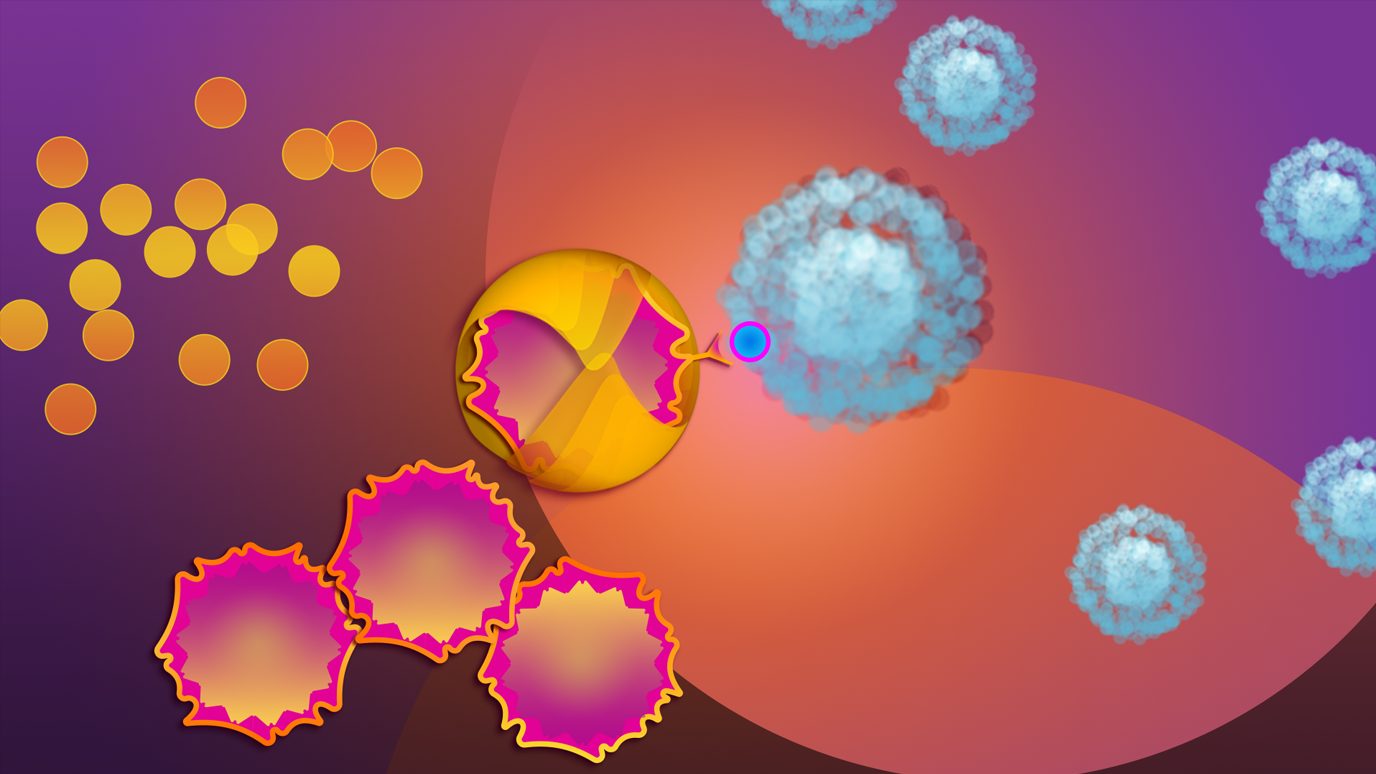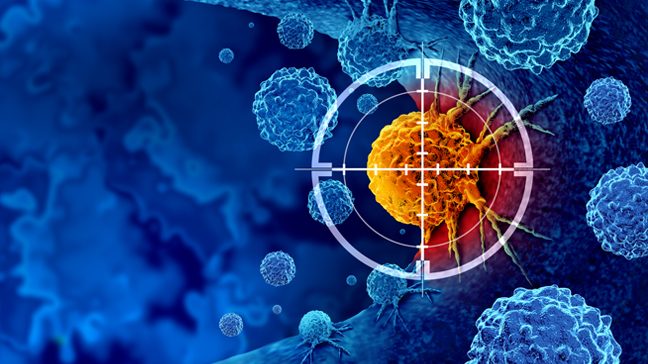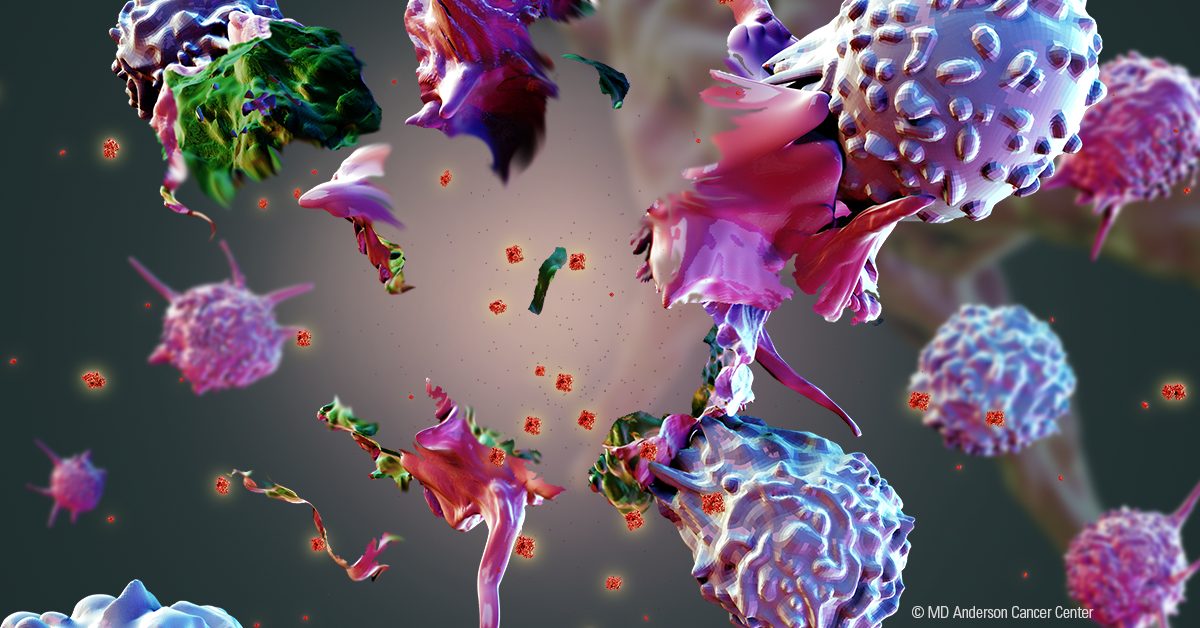How does cancer immunotherapy work?
- Treatment Options
- Ablation Therapy
- Angiogenesis Inhibitors
- Awake Craniotomy
- Brachytherapy
- Breast Reconstruction Surgery
- CAR T Cell Therapy
- Chemotherapy
- Cryoablation
- High-Intensity Focused Ultrasound (HIFU)
- Histotripsy
- Hyperthermic Intraperitoneal Chemotherapy
- Immunotherapy
- Immune Checkpoint Inhibitors
- Integrative Medicine
- Interventional Oncology
- Laser Interstitial Thermal Therapy (LITT)
- Microwave Ablation
- Minimally Invasive Surgery
- MR-Linac Radiation Therapy
- Palliative Care
- Proton Therapy
- Radiation Therapy
- Radiofrequency Ablation
- Stem Cell (Bone Marrow) Transplantation
- Stereotactic Body Radiation Therapy
- Stereotactic Radiosurgery
- Surgery
- Targeted Therapy
- Theranostics
- Y90 Radioembolization
Immunotherapy
Immunotherapy is a treatment that uses a person's immune system to eliminate cancer.
The immune system finds and defends the body from infection and disease. Cancer is a complex disease that can evade and outsmart the immune system. It’s often not recognized until it has already become too difficult to handle. Immunotherapy can improve the way the immune system works, allowing it to find and get rid of cancer cells.
What diseases does immunotherapy treat?
Immunotherapy is mainly used to treat cancer by helping the immune system recognize and attack cancer cells. It is commonly used for:
- Bladder cancer
- Colorectal cancer
- Esophageal cancer
- Head and neck cancers
- Kidney cancer
- Leukemia
- Liver cancer
- Lung cancer
- Lymphoma
- Melanoma (skin cancer)
- Multiple myeloma
- Nasopharyngeal cancer
- Sarcoma
- Stomach cancer
- Triple-negative breast cancer
Doctors are also researching immunotherapy for other cancers and some autoimmune diseases.
Who gets immunotherapy?
You may be a candidate for immunotherapy if:
- It is recommended either as a first treatment (frontline) or in combination with other treatments such as chemotherapy.
- Your cancer has specific features that respond well to immunotherapy. Your doctor may do tests to check.
- You have a strong immune system that can handle the treatment.
Your care team will determine if immunotherapy is right for you based on your cancer type, overall health and previous treatments.
What happens during an immunotherapy procedure?
Immunotherapy is given in different ways:
- IV infusion: The most common method, where medication is delivered through a vein over a few hours.
- Pills or tablets: Some immunotherapy drugs come in pill form.
- Injections: Some treatments are given as a shot under the skin.
- Topical application: For certain skin cancers, immunotherapy can be applied as a cream.
You may receive immunotherapy every few weeks in cycles, with rest periods in between. During treatment, your medical team will monitor you for reactions and side effects.
What are the different types of immunotherapy?
There are several types of immunotherapies, and each helps the immune system in a different way.
Sometimes, two different types of immunotherapies are combined during treatment. Other times, a single immunotherapy is used with another type of therapy, such as chemotherapy. These combination approaches are used to improve treatment.
Immune checkpoint inhibitors help cancer-fighting immune cells, called T cells, mount a longer-lasting response against the cancer.
Adoptive cellular therapy increases the number and/or effectiveness of immune cells, usually T cells, which improves the power of the immune response against the cancer. There are four main types of adoptive cellular therapy:
- Chimeric antigen receptor (CAR) T cell therapy gives patients large amounts of T cells that are all genetically engineered to find and fight the cancer.
- Chimeric antigen receptor (CAR) natural killer (NK) cell therapy is a promising new cellular immunotherapy that is still in clinical trials. NK cells are immune system cells that identify and then kill abnormal cells, including some cancer cells. Many cancers are good at avoiding detection, though. This limits the ability of NK cells to fight the disease naturally. In CAR NK cell therapy, NK cells are engineered to better recognize cancer, boosting their ability to find and kill cancer cells. Researchers do this by collecting NK cells from donated umbilical cord blood. They then add a molecule known as a chimeric antigen receptor, or CAR, to the NK cells. This CAR recognizes a molecule on the surface of cancer cells, enabling the CAR NK cells to better find and fight cancer.
- Tumor infiltrating lymphocyte (TIL) therapy uses a patient’s T cells that are collected from a piece of surgically removed tumor. While these cells may recognize the cancer, there are too few of them to succeed. The number of these cells is increased substantially in the lab and then given back to the patient.
- Endogenous T cell (ETC) therapy uses T cells from a patient’s blood. From this diverse pool of T cells, doctors select only those that may recognize the cancer. The number of these specific T cells is increased substantially and then given back to the patient.
Cancer vaccines help the body recognize cancer cells and stimulate the immune system to destroy them. Cancer vaccines usually contain one of the following:
- Cancer cells taken from the patient’s tumor
- Proteins designed to attach themselves to cancer cells
- Proteins specific to a patient’s tumor
Monoclonal antibodies attach to specific proteins on the surface of cancer cells or immune cells. They either:
- Mark the cancer as a target for the immune system, or
- Boost the ability of immune cells to fight the cancer
Cytokine therapy relies on proteins called interferons and interleukins to trigger an immune response. Interleukin-2 (IL-2) is used to treat kidney cancers and melanomas that have spread to other regions of the body. Interferon alpha (IFN-alpha) is currently being used to treat melanoma, kidney cancer and certain leukemias and lymphomas. These cytokine treatments are also being combined with other types of immunotherapies to increase their effectiveness.
Several immunotherapies are standard treatments for certain cancers, while others are only offered through clinical trials. Some types of cancer aren’t treatable by current immunotherapies. To extend the benefits of immunotherapy, MD Anderson is leading research to identify new and more effective ways to improve the immune response to cancer.
What are the side effects of immunotherapy?
Each type of immunotherapy has distinct side effects. Additionally, certain immunotherapies are more effective for some types of cancer than others. A patient’s overall health and type of cancer determine which immunotherapies are available to them.
Common side effects include:
- Fatigue
- Skin rash or itching
- Flu-like symptoms (fever, chills, muscle aches)
- Nausea or diarrhea
- Suppressed immune system with higher risk for infections
- Low blood counts
More serious side effects (less common but possible) include:
- Inflammation of organs (lungs, liver, intestines, or thyroid)
- Autoimmune reactions, where the immune system attacks healthy tissues
- Severe allergic reactions
Your care team will monitor you closely and can adjust treatment or provide medications to help manage side effects.
Clinical Trials
MD Anderson patients have access to clinical trials offering promising new treatments that cannot be found anywhere else.
Allison Institute™
Immunotherapy has transformed care for many patients with cancer. However, not all patients benefit. Our goal is to change that.
How does cancer immunotherapy work?
Featured Articles

Next-generation sequencing and immunotherapy give bladder cancer patient hope

What is the future of cell therapy in cancer treatment?

How beautiful images can advance immunotherapy

Lung cancer survivor grateful for immunotherapy clinical trial

Researcher studies tumor cell interaction to improve immunotherapy

CAR NK cell therapy now an experimental treatment option for multiple cancers

What’s new in immunotherapy for prostate cancer?

Which cancers can be treated with immune checkpoint inhibitors?
request an appointment online.
Help #EndCancer
Give Now
Donate Blood
Our patients depend on blood and platelet donations.
Shop MD Anderson
Show your support for our mission through branded merchandise.
